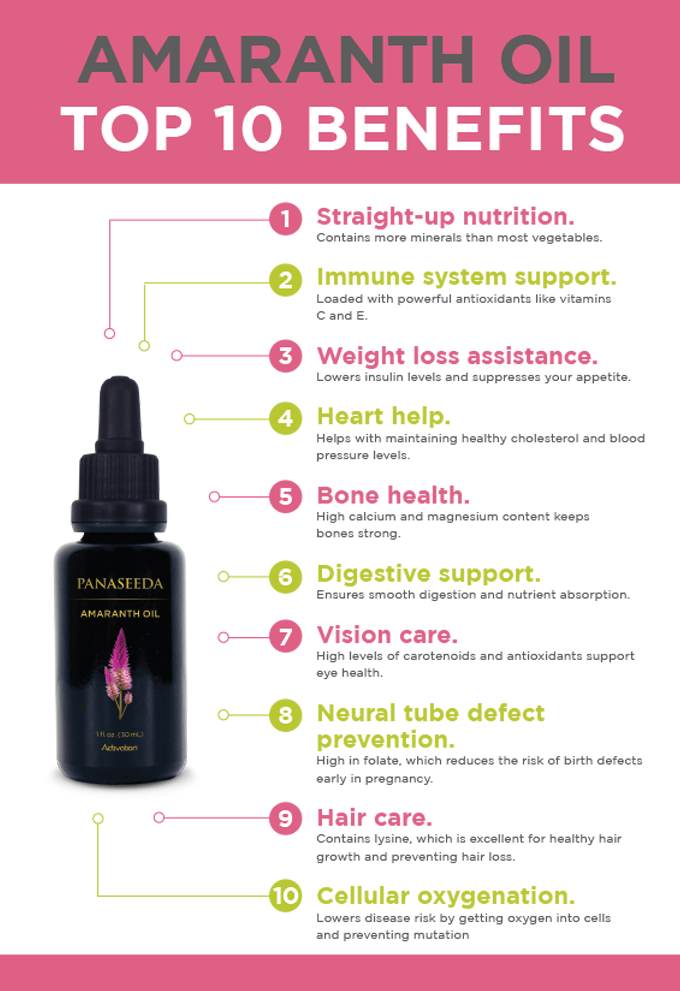The Top 10 Benefits of Amaranth Oil
Amaranth is a grain that rivals many trendy superfoods when it comes to its nutritional power.
These are our top 10 reasons to make amaranth part of your daily life:
It’s a natural multi-vitamin
Amaranth provides you with many of the vitamins, minerals, proteins and fats that your body needs.
In fact, amaranth actually contains more minerals than most vegetables.
You don’t have to take my word for it, Charlie Pulsipher at SunWarrior.com can back me up: “Amaranth is a very rich source of minerals like calcium, magnesium, and copper. It is also a good source of zinc, potassium, and phosphorus. These build strong bones and muscles, aid hydration, boost energy, and are vital in thousands of processes throughout the body. Amaranth is also a good source of many essential vitamins too, including A, C, E, K, B5, B6, folate, niacin, and riboflavin. These act as antioxidants, raise energy levels, control hormones, and do much more.”
In addition to that, amaranth contains lots of protein, fiber and amino acids.
It’ll boost your immune system
Amaranth is loaded with powerful antioxidants like vitamins C and E that help your body to fight off bugs.
Many people turn to antioxidants like vitamin C when they are fighting colds or the flu, but getting antioxidants in your diet regularly can help you prevent illness in the first place.
It can help you reach your weight loss goals
Whether you have a lot or a little that you want to lose, adding amaranth to your diet can help you shed those excess pounds.
Interested in the details? OrganicFacts.net lays it out nicely: “Considering that an influx of protein in the diet releases a particular “sated” hormone that suppresses the appetite, eating amaranth grains and leaves can help you remain true to your weight loss goals. The dietary fiber is also bulky in your stomach and reduces your appetite, lowering your likelihood to snack between meals and pack on those extra pounds.”
Amaranth is also a natural source of squalene, which is a strong anti-inflammatory and reducing inflammation can contribute to weight loss. Plus, since amaranth is great for your digestive system and for encouraging your body to detox, it supports weight loss on multiple fronts.
Amaranth is great for your heart
Maintaining healthy blood pressure and cholesterol levels and keeping silent inflammation at bay are important ways to support your heart health. Amaranth does all that, making it very beneficial for your heart.
How does it accomplish this? Amaranth has plenty of fiber, which is known to reduce plaque build up in your arteries, as well as phytonutrients, which, along with fiber, help to lower bad cholesterol (LDL) levels and balance your blood pressure.
It also has a significant amount of squalene in it, which helps reduce inflammation throughout your body, reducing your risk of heart disease.
It’s better than milk for bone health
It turns out that amaranth has the perfect combination of nutrients for ensuring strong bones.
According to Pamela Durkin at Alive.com: “When it comes to bones, amaranth offers up a payload of minerals renowned for keeping them strong—calcium, magnesium, phosphorus, and manganese. Mother Nature also wisely added high amounts of the amino acid lysine to this mix.
Amaranth supports your digestive system
Amaranth is high in fiber, which is great for supporting your digestive system because it helps to keep you regular and prevents constipation. It’s also prebiotic, which helps to keep your gut healthy by making it a friendlier environment for good bacteria. Check out this recent blog post to learn more about prebiotics and probiotics for good gut health.
In addition, Amaranth is gluten-free, making it an excellent option for those with gluten intolerances or celiac disease.
It protects your eyes
Amaranth contains lutein, which is excellent for your eyes. Dr. Andrew Weil explains: “There is very good evidence that the lutein in food helps protect against cataracts and macular degeneration, two common, age-related eye disorders. Lutein and another carotenoid, zeaxanthin, form the yellow pigment of the retina and absorb blue light, a harmful component of sunlight.“
Combined with vitamins A and C and beta-carotene, lutein helps to ensure healthy mucous membranes including those around your eyes, which also helps to protect your vision.
It helps prevent birth defects in early pregnancy
Women of childbearing age are encouraged to get plenty of folate (or folic acid, which is the synthetic form) because it prevents neural tube defects during early pregnancy, which affect the spine and brain.
These defects occur very early in pregnancy, which is why it’s ideal to start getting folate at least a month before getting pregnant. Since that can happen at any time, doctors recommend that all women of childbearing age get plenty of it.
Getting enough of this nutrient can reduce the risk of neural tube defects by up to 70%.
Folate is also necessary for DNA creation and repair and for producing red blood cells. Folate deficiency can lead to conditions such as anemia.
Fortunately, amaranth is an excellent source of folate.
Amaranth can give you stronger, shinier hair
There are a number of ways to use amaranth for your hair, from eating it to putting amaranth oil directly onto your hair. It can help to prevent breakage, it adds moisture, it relieves dry itchy scalp and it leaves your tresses healthy and strong from the roots down.
Amaranth contains lysine, which is great for encouraging healthy hair growth and preventing hair loss.
We’ve got a great post all about using amaranth oil for beauty, check it out here.
Amaranth combats oxidative stress
The powerful antioxidants in amaranth help your body to battle the free radicals that can cause other cells to mutate. Free radicals can get out of hand and lead to disease if you don’t take steps to reduce oxidative stress.
There are many causes of oxidative stress, including poor nutrition (too much sugar and processed foods), stress and pollution.
The symptoms of oxidative stress include fatigue, inflammation, inability to sleep or focus, headaches, a compromised immune system, memory loss and more.
Getting lots of antioxidants can help you fight back, as they stop free radical cells from continuing to damage other cells. What gives amaranth the upper hand against oxidative stress is that it contains squalene, which is a particularly powerful antioxidant that rivals even vitamin E for efficiency.
Amaranth: Past and Present
Amaranth was used by ancient Aztec cultures thousands of years ago. They didn’t just eat it, they used it in their religious ceremonies too.
When the Spanish landed in Mexico, they wanted to convert the Aztecs to Christianity. They banned anything that was tied to the Aztec religion. This included amaranth.
As a result, Amaranth was no longer farmed, and it was mostly unknown for many, many years.
Fortunately, it was discovered growing wild and was re-introduced, this time on a more global scale. Amaranth is fairly easy to grow, and once it takes root it can be maintained even in low-water situations, making it an excellent food option in the developing world.
It has become more popular in North America in the last few years and you can probably find it in your local grocery store or bulk store. You might not want to eat it every day though, so what can you do to get the benefits daily, without having to switch to amaranth salads 7 days a week?
Amaranth: Beyond the Grain
What you need is to get your hands on amaranth oil, Perfectly Pressed™ and guaranteed fresh from the dropper.
With as few as 5 drops for every 50 pounds of body weight, you can reap the benefits of this nutritional powerhouse for yourself. You only need a little to get a lot.
There are many ways to use this seed oil, but whether you swallow it or apply it topically, you’ll notice a difference in your health and your overall performance.
Don’t wait, upgrade your level of wellness today. Click here to get your bottle of Panaseeda Amaranth Oil today!
Resources
http://wholegrainscouncil.org/whole-grains-101/easy-ways-enjoy-whole-grains/grain-month-calendar/amaranth-may-grain-month
http://lajollamom.com/amaranth-grain-leaves-health-benefits/
http://www.botanical-online.com/english/amaranth_medicinal_properties.htm
https://www.organicfacts.net/health-benefits/vegetable/amaranth.html
https://sunwarrior.com/healthhub/11-health-benefits-of-amaranth
http://www.alive.com/food/amazing-amaranth/
http://www.babycenter.com/0_folic-acid-why-you-need-it-before-and-during-pregnancy_476.bc
http://www.traditionaloven.com/foods/specific-nutrient/flour-cereal-grain-pasta/amaranth-grain-cook/folate-total.html
http://www.alive.com/food/amazing-amaranth/
http://pilladvised.com/2014/10/7-signs-of-oxidative-stress/
http://www.drweil.com/health-wellness/body-mind-spirit/vision/lutein-good-for-your-eyes-and-heart/
http://www.thegracevine.com/amaranth.html
http://foodfacts.mercola.com/amaranth.html











